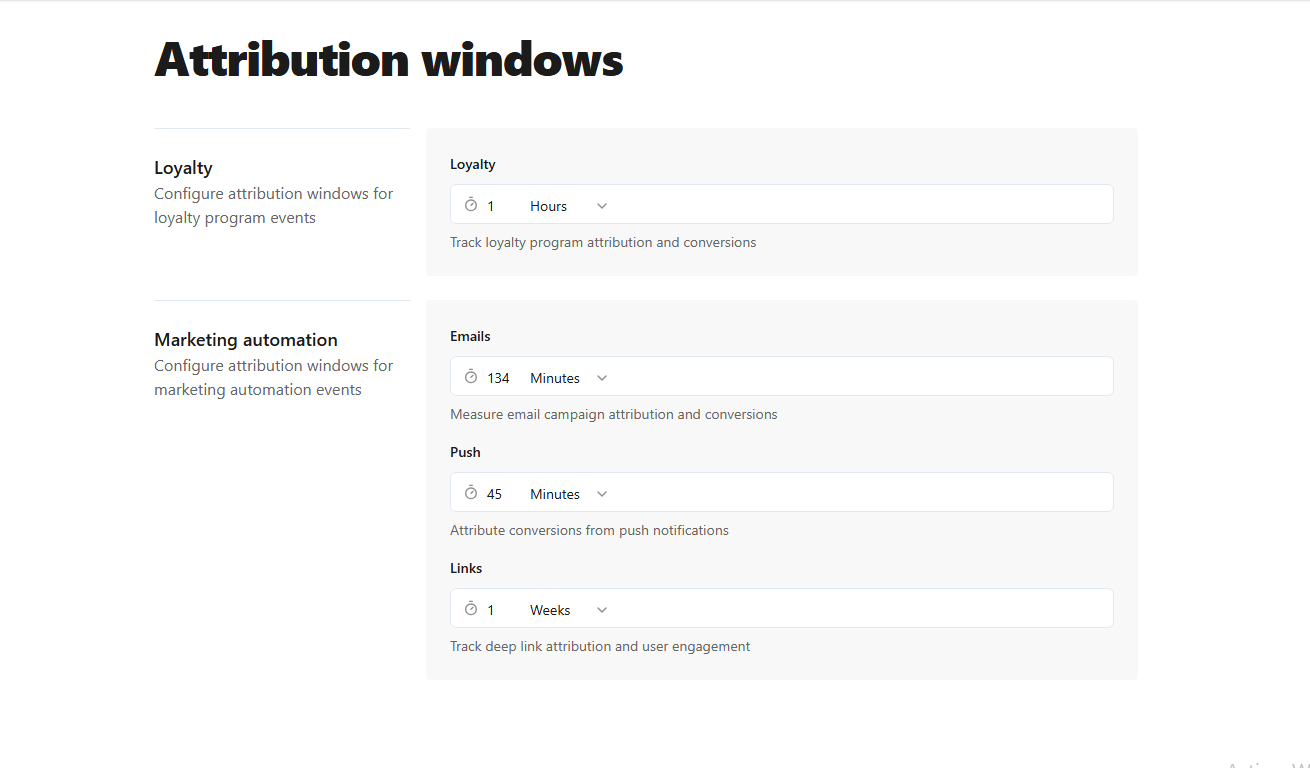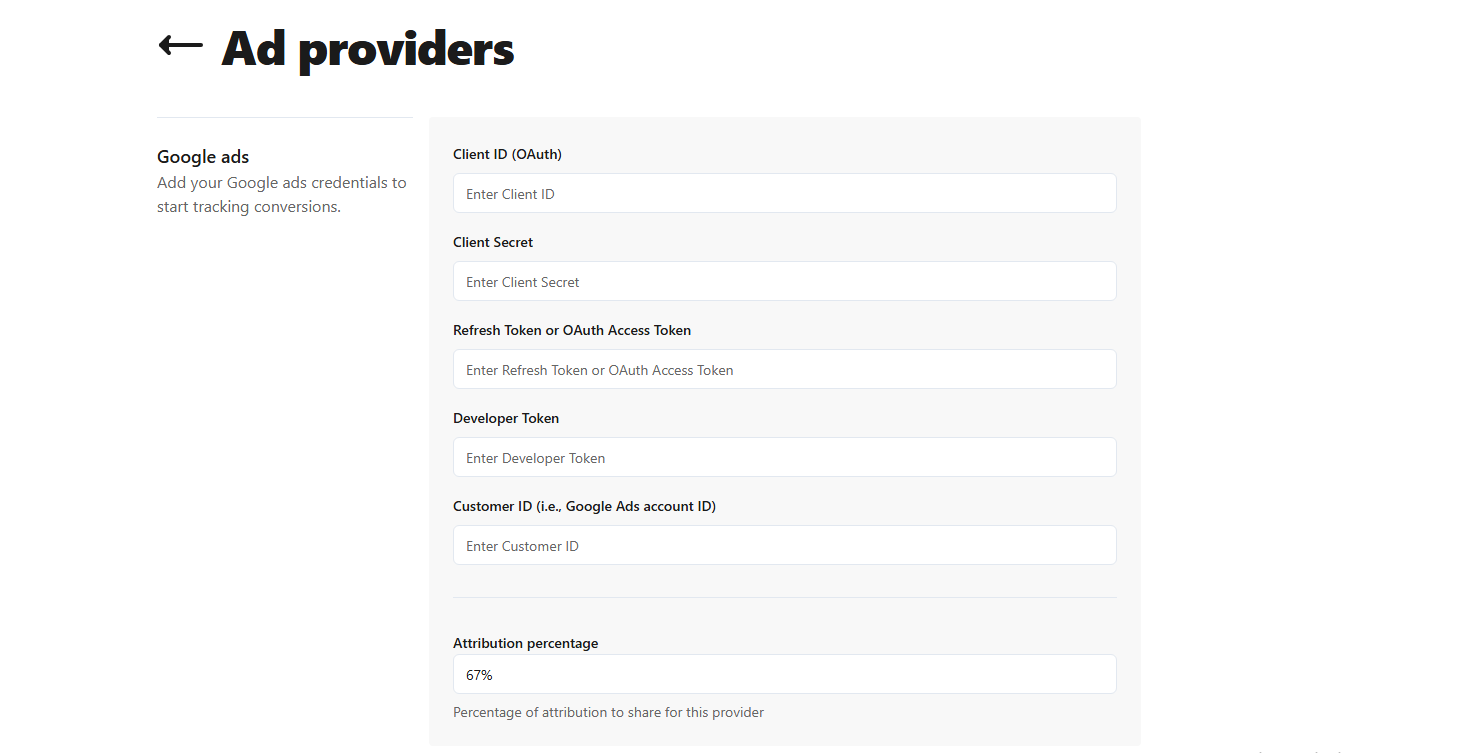Overview
Masivo’s Purchase Attribution System automatically tracks and attributes customer purchases to their originating marketing touchpoints, whether from marketing automation campaigns (links, emails, push notifications) or loyalty program engagement. This system enables you to measure campaign effectiveness, calculate ROI, and understand which channels drive conversions.Attribution is calculated automatically based on tracking IDs, loyalty
transactions, and configured attribution windows. This guide covers setup,
configuration, and implementation best practices.
How Attribution Works
The attribution system operates in three stages:- Event Collection: Purchases and touchpoints (link clicks, reward accumulations) are tracked with attribution data
- Attribution Calculation: System matches purchases to their originating touchpoints within configured time windows
- Performance Analysis: Attribution data powers analytics and ROI calculations
Attribution Flow Diagram
Attribution Types
Masivo supports two primary attribution types:1. Marketing Attribution
Tracks purchases that originated from marketing campaigns including:- Links/Deeplinks: Short URLs with tracking parameters
- Email Campaigns: Email templates sent via marketing automation
- Push Notifications: Push campaigns with tracking
tracking_id - Links the customer’s journey from click to purchase
2. Loyalty Attribution
Tracks purchases influenced by loyalty program engagement:- Reward Accumulation: Customer earned rewards before purchase
- Reward Redemption: Customer redeemed rewards during purchase
event_id - Links reward transactions to purchase events
Setting Up Attribution
Step 1: Configure Attribution Windows
Attribution windows define how long after a touchpoint a purchase can be attributed to that campaign. Navigate to Settings → Attribution Windows in your Masivo dashboard.
Step 2: Configure Ad Providers
Ad providers define traffic sources and their attribution share for multi-touch attribution. Navigate to Settings → Ad Providers in your Masivo dashboard.
| Provider | Type | Attribution % | Use Case |
|---|---|---|---|
| Google Ads | google | 100% | Single-touch attribution |
| Meta Ads | meta | 50% | Multi-touch with other channels |
email | 100% | Direct email campaigns |
100%: Full revenue credit to this channel<100%: Partial credit (for multi-touch attribution)- Used to calculate channel-specific ROI
Step 3: Implement Attribution in Events
The most critical step is including attribution data when sending events to Masivo.Essential: The ad_provider Parameter
The ad_provider is crucial for attribution tracking. It identifies the traffic source and must match a configured ad provider in your settings.
Where ad_provider Comes From:
- From Masivo Short Links (Recommended):
Set
ad_providerin the destination URL when creating the link:
ad_provider parameter intact. Your app extracts it from the URL.
- Direct in Events (Only if not from a link): If the purchase didn’t originate from a Masivo link, include it in the event:
Complete Event Implementation
Attribution Object Structure
Complete Attribution Schema
Fallback Behavior
Masivo’s attribution system uses intelligent fallbacks:Attribution Calculation Logic
Marketing Attribution Flow
-
Customer clicks marketing link
LINK_OPENevent created withtracking_id- Timestamp recorded:
2025-01-15 12:00:00
-
Customer makes purchase
PURCHASEevent includes sametracking_id- Timestamp recorded:
2025-01-17 14:30:00
-
Attribution calculation
-
Attribution record created
- Links purchase to campaign
- Records conversion metrics
- Powers analytics dashboards
Loyalty Attribution Flow
-
Customer earns rewards
PURCHASEevent creates accumulation transactionevent_idlinks transaction to event- Timestamp:
2025-01-10 10:00:00
-
Customer makes new purchase with redemption
PURCHASEevent with same customer- Customer redeems previously earned rewards
- Timestamp:
2025-02-05 15:00:00
-
Attribution calculation
-
Loyalty attribution record created
- Tracks loyalty program impact
- Measures program ROI
- Identifies high-value loyalty customers
Time-to-Conversion Metrics
Attribution automatically calculates and stores:- Marketing Campaigns: Minutes from link click to purchase
- Loyalty: Minutes from first reward accumulation to purchase
- Conversion Rate: Percentage of clicks that convert
- Revenue per Click: Average revenue per campaign click
Testing Attribution
1. Test Link Attribution
2. Test Loyalty Attribution
Best Practices
1. Always Include ad_provider
2. Use Consistent Naming Conventions
Troubleshooting
No Attribution Records Created
Problem: Purchases not being attributed to campaigns Solutions:- Verify
tracking_idis included in purchase events - Check attribution windows aren’t too restrictive
- Confirm
ad_providermatches configured providers - Ensure timestamp of purchase is after touchpoint
Incorrect Attribution Percentage
Problem: Revenue is over/under-attributed Solutions:- Review ad provider configuration percentages
- Check for duplicate provider names
- Verify provider names match exactly (case-sensitive)
Missing Loyalty Attribution
Problem: Loyalty-driven purchases not attributed Solutions:- Verify
event_idexists on purchase events - Check loyalty attribution window is adequate (30-60 days recommended)
- Ensure customer has reward transactions before purchase
- Confirm reward accumulations have valid timestamps
Time to Conversion is NULL
Problem: Attribution records missing conversion time Solutions:- Check that link/accumulation timestamp is valid (not 1970-01-01)
- Verify timestamp is before purchase time
- Ensure
line_issued_atortransaction_issued_atfields are populated
Next steps
Once your attribution system is configured and tracking data, you can analyze performance:- View analytics: Navigate to Analytics to see attribution reports, campaign ROI, and conversion metrics across all channels
- Export data: Learn how to export analytics tables to CSV for deeper analysis of attribution patterns, multi-touch conversion paths, and campaign performance
Related Resources
- Attribution Tracking API Guide - Developer implementation details
- Journey Triggers - Automated campaign triggers
- Create Links - Marketing link creation
- Track Customer Activity - Event tracking basics
- Marketing Automations - Campaign setup